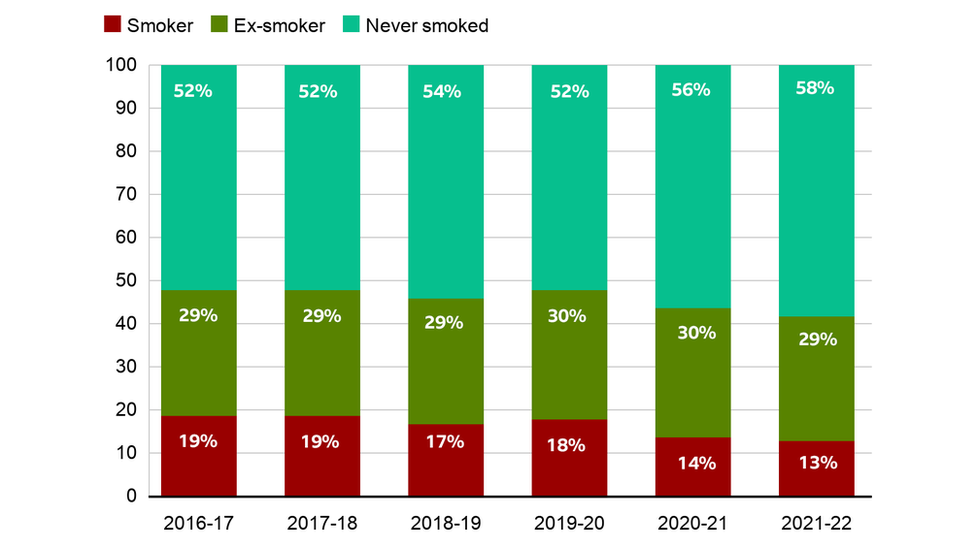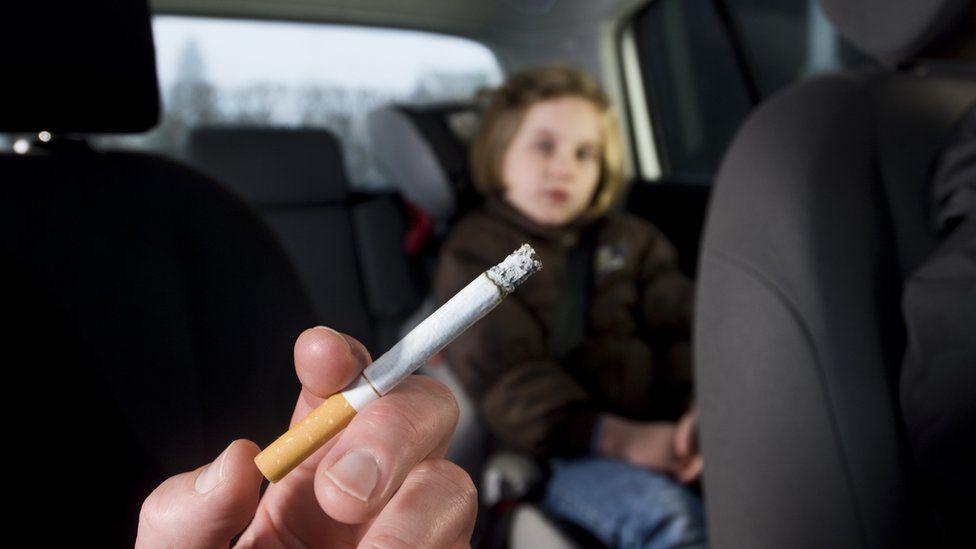Smoking: Can Wales reach smoke-free status by 2030?
- Published

Dan James has managed to stop smoking after taking it up when he was 12
Could Wales really be smoke-free in the next eight years?
The first steps are in place, with the aim by the Welsh government to reduce smoking rates in adults to 5% or less by 2030.
One ex-smoker Dan James, 28, who began when he was 12, said he thought 2030 was a realistic target.
However, lobby group Forest called on the target to be scrapped, saying the only way it could be achieved was through "bullying and coercion".
According to the Welsh government,, external a smoke-free Wales "means achieving a smoking prevalence rate in adults of 5% or less," and at that level "the tobacco epidemic could become unsustainable".
The strategy aims to reduce inequalities, with a specific emphasis on future generations.
Mr James quit smoking earlier this year, and said the Welsh government had a chance of making Wales smoke-free by 2030, as more advertising the assistance available "will help people with their choices".
Dan, who lives in Cardiff Bay, had tried unsuccessfully to give up once, before finally kicking the habit.
"In 2019, I quit smoking but only managed it for a year. I called my doctor to help me quit smoking and spoke to an adviser."

Dan started figure skating before he quit smoking and said one of the main reasons was so he would be fitter for his sport
After quitting, Dan has days where he craves cigarettes, but said he felt much fitter now when on the ice.
He said: "I'm not coughing up mucus now, I generally feel healthier and I can taste my food."
Ruth Billingham, 42, from Cardiff, has been smoking on and off since she was a teenager.
She had long periods of not smoking, and has gone back to it due in social situations.
She said: "When I started smoking you could smoke inside pubs. I think it's a good thing that people aren't allowed to smoke in public places because I definitely would not have smoked as much as I have.
"At times when I've given up, I might start again because I'm on a night out, and it's just easy to have a cigarette.
"I would find it frustrating that I couldn't smoke outdoors. However, I do think in the long term it would be better for me because I wouldn't be able to smoke."

Ruth Billingham says it's easy to light up on a cigarette on a night out
She was unsure whether the Welsh government would reach its ambition by 2030.
"There's eight years and if you can smoke in fewer places that will help.
"It's a good ambition, whether it's achievable I'm not totally sure, but if they bring in a ban in public places it will help.
"People might say 'oh I'm not going out any more', but they will. They will just adapt to the change and smoke fewer cigarettes."
The Welsh government's plans do not include e-cigarettes. However it said its strategy to deliver a smoke-free Wales did include discouraging e-cigarettes or other nicotine products by teenagers and young people.
Deputy Minister for Mental Health and Wellbeing Lynne Neagle said: "Whilst around 13% of people in Wales are smokers, we know that those living in our more deprived communities are much more likely to smoke than those in the least deprived areas."
A 2021 lifestyle survey revealed 13% of adults in Wales smoke, down from 19% five years before. But that number jumped to 22% in the most deprived communities.

Source: National Survey for Wales (2021). The number of smokers in Wales is gradually declining
Simon Clark, director of the smokers' lobby group Forest, said: "Tobacco is a legal product and if adults choose to smoke that's a matter for them, not government. They cannot be forced to quit.
"The best way to further reduce smoking rates is not by introducing more anti-smoking measures but by educating young people about the health risks of smoking and encouraging existing smokers to switch to reduced risk products like e-cigarettes."
Smoke-free environments
Hospital grounds
Public playgrounds
School grounds
Holiday and temporary accommodation
Mental health units (from 1 September)
However, Ash Wales, which wants a smoke-free Wales, said the country supported the new strategy.
Suzanne Cass, chief executive of the group, said: "73% of Welsh adults want Wales to become smoke-free.
"The Welsh government's commitment to this target is welcome. However, this bold strategy is going to need bold and decisive action to hit that 5% target by 2030."

Smoking kills more than 5,000 Welsh adults every year, according to Ash Wales
Figures released last month revealed 4% of the estimated Welsh smoking population made an attempt to quit via smoking cessation services from April 2021 to March 2022.
This equated to 14,574 of 357,745 Welsh smokers.
Smoking is the lead cause of premature death in Wales and is estimated to cost the Welsh NHS £302m per year.
According to modelling by Cancer Research in 2020, if the current trajectory were to continue, Wales would not achieve smoke-free status until 2037.
Katie Till, public affairs manager in Wales for Cancer Research UK, said: "Smoking remains the biggest preventable cause of cancer and is responsible for around 3,100 cancer cases in Wales every year."
A YouGov survey in 2021 revealed 67% of people would support banning smoking in outdoor eating areas, such as pubs restaurants and cafes.
A further 81% believed smoking should be banned in outdoor areas where children play sport.

It has been illegal to smoke in a car with children since 2015 in both Wales and England
Other countries have also voiced ambitions to achieve a 5% smoking rate, including Scotland, England and Ireland.
Internationally, 5% is often regarded as the rate when the tobacco epidemic is considered unsustainable.
The next smoking delivery plan will be published in 2024.

TRANSFER: THE EMILIANO SALA STORY: Why was Emiliano Sala on that plane?
SAM SMITH PRESENTS STORIES OF HIV: From Terrence Higgins to today

Related topics
- Published20 June 2022

- Published13 July 2022

- Published26 July 2022
